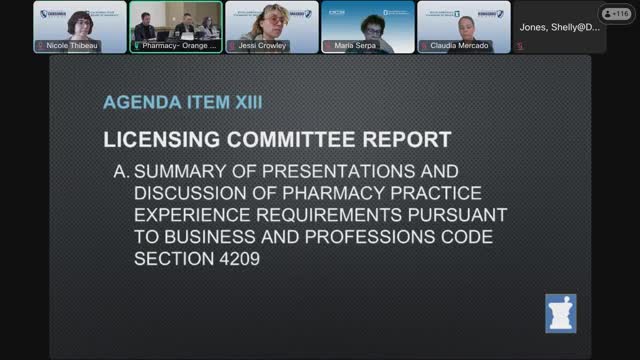Board debates internship hours, approves PTAC design and application process under AB1503

Summary
Board members, schools and students debated reinstating internship hours for pharmacist licensure; the board approved creating a Pharmacy Technician Advisory Committee (PTAC) with an application process and minimum experience guidance while deferring broad internship mandates.
The Licensing Committee and full board devoted significant time to the question of pharmacy practice experience for pharmacist licensure and to implementing AB1503.
Committee members reviewed presentations from pharmacy school and health‑system leaders on ACPE experiential standards, workforce readiness, and the historical 1,500‑hour intern requirement. Some board members (including Jesse Crowley) argued that sustained work experience better prepares new pharmacists; others warned a mandatory 1,500‑hour return would create access and equity problems for students and strain hospital and community placement capacity.
Public commenters — faculty, students, and professional groups — urged collaborative, incentive‑based approaches rather than an across‑the‑board mandate. The California Pharmacists Association recommended incentives and partnerships between schools and employers and cautioned against reinstating mandatory hours because of administrative and equity impacts.
Separately, the board moved forward with AB1503 implementation tasks: it approved establishing a Pharmacy Technician Advisory Committee (PTAC) as required by the statute, and agreed a public application process should include a letter of intent, two letters of recommendation, and a CV. Members landed on a practical appointment approach: two board members (assigned by the president) will review applicant pools for each technician seat to preserve confidentiality while ensuring a multi‑member review. The board favored requiring roughly three years of experience in a single practice setting for technician appointees (community, hospital, or other specified practice settings) while leaving two seats open to unspecified settings to preserve flexibility.
What happens next: Staff will prepare an online application and timeline for PTAC appointments, stagger initial terms, and return with further policy language regarding intern incentives and possible lower‑hour 'incentive' programs or certifications that encourage hands‑on experience without a rigid mandate.
Quotes
"I actually would be supportive of a mandate," said board member Jesse Crowley, noting students with consistent work experience often perform better. "A mandate could create inequitable financial and logistical burdens," warned CPHA's Sean Kim, who urged incentive‑based models and school‑employer partnerships.
Closing note: The board left the question of a reinstated, mandatory internship requirement unresolved and will pursue policy statements and incentive options while moving ahead with PTAC formation.

